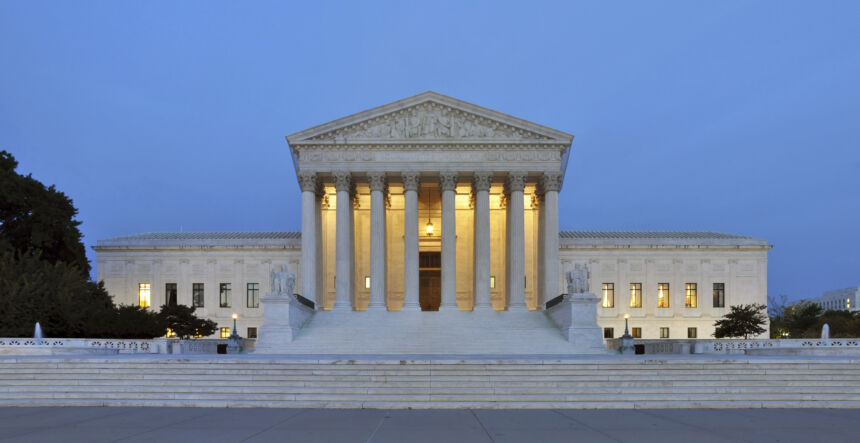January 12, 2015
Conservative Supreme Court justices favor business, liberal ones favor investors, study finds

UNIVERSITY PARK, Pa. (January 12, 2015) – Conservative Supreme Court justices more often vote in favor of business, while their more liberal counterparts more often favor investors in securities regulation cases, according to research by two Penn State professors.
Johannes Fedderke, professor of international affairs in Penn State’s School of International Affairs, and Marco Ventoruzzo, affiliate professor with the Penn State School of International Affairs and Penn State Law professor, examined 49 Supreme Court decisions from 1930 through 2011 and compared the justices’ votes to their political ideologies. Their paper, “Do Conservative Justices Favor Wall Street? Ideology and the Supreme Court’s Securities Regulation Decisions,” forthcoming in the Florida Law Review, is the first statistical analysis specifically focusing on how political ideology correlates with judicial decision-making in securities regulation.
While this might appear to be self-evident with respect to seemingly more politically charged issues such as freedom of speech, abortion, or gun control, the contribution made by this study is in showing that political and policy preferences also play a role in the highly technical area of financial markets regulation.
“When the justices meet to decide cases dealing with financial regulation issues … their ideology appears to have a seat at the conference table,” they write. “There is a correlation between the voting of the justices and their position on the political spectrum, and this appears to be consistent using different measures of the ideology or political affiliations of the justices.”
The researchers used four different measures of political ideology: the party of the appointing president, the economic liberalism of the appointing president, and the justices’ scores on two indexes, Cover-Segal and Martin-Quinn. The Cover-Segal score comes from analyzing the content of newspaper editorials about the justices’ nominations to the court. Martin-Quinn scores are based on the actual votes of the justices during their terms.
The researchers generally defined pro-business decisions as those that limit government intervention in the securities market or that do not foster investors’ protection, for example, excluding civil liability for misstatements or omissions in connections with transactions in securities. This coding does require some judgment calls to be made. For example, the study considers decisions that favor an active market for corporate control and those that expand insider trading prohibitions to be pro-investor, even though not all scholars and practitioners would likely agree with this classification.
The article finds a correlation across all measures of political ideology. Justices appointed by Republican presidents voted pro-business in 58 percent of the cases and Democrat-appointed justices voted pro-investor in 60 percent of the cases. The indexes showed a similar pattern. On average, the more conservative index scores were associated with more votes in favor of business, and the more liberal index scores were associated with votes in favor of investors.
Fedderke and Ventorruzzo caution, however, that their results do not mean that the justices intentionally distort the law to achieve a pre-determined result, or that they have a bias. First, they note that the statistical correlation between ideology and decisions is far from perfect—other factors are important in determining the outcomes.
In addition, they write: “When there is room for interpretation, and reasonable minds can disagree, judges and justices can reach different conclusions also based on their values, understandings, and beliefs. … In fact, the observation that ideology plays a role in their decision making, might simply mean that, when the law is ambiguous, or does not clearly resolve an issue, and different interpretations are possible, the views of the justices concerning the underlying policy of securities laws affect their reading of complex and hard legal issues, as it should be.”
In the course of their analysis, the researchers discovered other trends in the Supreme Court’s decisions on securities litigation. They found that the Court has become increasingly more divided, with more dissenting opinions being published in the more recent cases; and the Court has become more conservative, especially when comparing the decisions under Chief Justice John Roberts to those under Chief Justice William Rehnquist.
“The data also indicate that pro-business decisions seem more controversial, again, considering the number of dissents,” they write. “This result might suggest that liberal justices are more active than conservative ones in voicing their positions when not satisfied with a decision.”
Although some scholars maintain that the Supreme Court’s decisions should be completely free of outside pressures – and some believe that they truly are -- the Penn State researchers argue that the political nature of the appointment process makes it almost inevitable that political leanings will play a part in decisions.
“The very independence of Supreme Court justices … in many ways allows them to follow even more freely their personal convictions, often the very convictions for which they have been selected in the first place,” Fedderke and Ventoruzzo write. “The very systems used in the U.S. to select the members of the judiciary, and for the Supreme Court in particular, should reasonably be expected to inject a political and ideological element in the jurisprudence of the courts.”
The best protection against the risk of unfair judicial decisions, according to the authors, is not in the unrealistic and naïve expectation that judges operate completely devoid of any ideology, but in a diverse composition of our courts.
